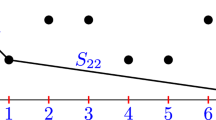Abstract
We show that in an ultraproduct of finite fields, the mod-n nonstandard size of definable sets varies definably in families. Moreover, if K is any pseudofinite field, then one can assign “nonstandard sizes mod n” to definable sets in K. As n varies, these nonstandard sizes assemble into a definable strong Euler characteristic on K, taking values in the profinite completion \(\hat {\mathbb{Z}}\) of the integers. The strong Euler characteristic is not canonical, but depends on the choice of a nonstandard Frobenius. When Abs(K) is finite, the Euler characteristic has some funny properties for two choices of the nonstandard Frobenius.
Additionally, we show that the theory of finite fields remains decidable when first-order logic is expanded with parity quantifiers. However, the proof depends on a computational algebraic geometry statement whose proof is deferred to a later paper.
Similar content being viewed by others
References
O. M. Alshanqiti, Pseudo-finite rings and their generalizations, Ph.D. thesis, University of Manchester, 2015.
J. Ax, The elementary theory of finite fields, Annals of Mathematics 88 (1968), 239–271.
F. Bittner, The universal euler characteristic for varieties of characteristic zero, Compositio Mathematica 140 (2004), 1011–1032.
Z. Chatzidakis and E. Hrushovski, Model theory of difference fields, Transactions of the American Mathematical Society 351 (1999), 2997–3071.
Z. Chatzidakis, L. van den Dries and A. Macintyre, Definable sets over finite fields, Journal für die reine und angewandte Mathematik 427 (1992), 107–135.
J. Denef and F. Loeser, Definable sets, motives, and p-adic integrals, Journal of the American Mathematical Society 14 (2000), 429–629.
B. M. Dwork, On the rationality of the zeta function of an algebraic variety, American Journal of Mathematics 82 (1960), 631–648.
R. Elwes and D. Macpherson, A survey of asymptotic classes and measurable structures, in Model Theory with Applications to Algebra and Analysis. Vo. 2, London Mathematical Society Lecture Note Series, Vol. 350 Cambridge University Press, Cambridge, 2008, pp. 125–160.
E. Freitag and R. Kiehl, Etale Cohomology and the Weil Conjecture, Ergebnisse der Mathematik und ihrer Grenzgebiete, Vol. 13, Springer, Berlin, 1988.
J. Freitag, W. Li and T. Scanlon, Differential Chow varieties exist, Journal of the London Mathematical Society 95 (2016), 128–156.
M. D. Fried and M. Jarden, Field Arithmetic, Ergebnisse der Mathematik und ihrer Grenzgebiete, Vol. 11, Springer, Berlin, 2008.
R. Hartshorne, Algebraic Geometry, Graduate Texts in Mathematics, Vol. 52, Springer, New York-Heidelberg, 1977.
W. Hodges, Model Theory, Encyclopedia of Mathematics and its Applications, Cambridge University Press, Cambridge, 1993.
E. Hrushovski, Pseudo-finite fields and related structures, in Model theory and Applications, Quaderni di matematica, Vol. 11, Aracne, Rome, 2002.
E. Hrushovski, The elementary theory of the Frobenius automorphisms, https://arxiv.org/abs/math/0406514.
W. Johnson and T. Xu, Computable ind-definability, work in progress.
C. Kiefe, Sets definable over finite fields: their zeta-functions, Transactions of the American Mathematical Society 223 (1976), 45–59.
J. Krajíček, Uniform families of polynomial equations over a finite field and structures admitting an euler characteristic of definable sets, Proceedings of the London Mathematical Society 3 (2000), 257–284.
J. Krajíček and T. Scanlon, Combinatorics with definable sets: Euler characteristics and Grothendieck rings, Bulletin of Symbolic Logic 6 (2000), 311–330.
J. S. Milne, Abelian Varieties, Course notes, https://www.jmilne.org/math/CourseNotes/av.html.
D. Mumford, Abelian Varieties, Studies in Mathematics, Vol. 5, Tata Institute of Fundamental Research, Bombay, 1970.
R. Pink, Finite group schemes and p-divisible groups, Course notes, http://www.math.ethz.ch/~pink/FiniteGroupSchemes.html.
J.-P. Serre, Algebraic Groups and Class Fields, Graduate Texts in Mathematics, Vol. 117, Springer, New York, 1988.
Acknowledgment
The author would like to thank Tianyi Xu, for helpful discussions about recursive ind-definability, Tom Scanlon, who read an earlier version of this paper appearing in the author’s dissertation, and the anonymous referee, who offered countless helpful comments and introduced the author to some of the important related papers.
This material is based upon work supported by the National Science Foundation under Grant No. DGE-1106400 and Award No. DMS-1803120. Any opinions, findings, and conclusions or recommendations expressed in this material are those of the author and do not necessarily reflect the views of the National Science Foundation.
Author information
Authors and Affiliations
Corresponding author
Rights and permissions
About this article
Cite this article
Johnson, W. Counting mod n in pseudofinite fields. Isr. J. Math. 247, 697–739 (2022). https://doi.org/10.1007/s11856-021-2279-x
Received:
Revised:
Published:
Issue Date:
DOI: https://doi.org/10.1007/s11856-021-2279-x



